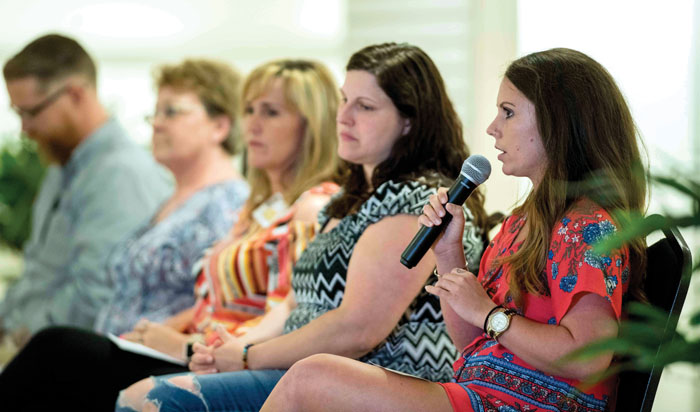Former opioid addicts, family members share their stories of sobriety during opioid forum
Published 12:00 am Wednesday, May 16, 2018

- Emily Gobble, right, tells of her experience with the opioid epidemic. Gobble was part of a panel discussion including individuals in treatment or parents who have lost children to overdose. Jon C. Lakey/Salisbury Post
SALISBURY — April 20 was an important milestone in the life of Emily Gobble. It’s the day she was two years sober.
Gobble spent seven years living a life in which no one really knew the suffering she endured as a heroin addict.
Gobble, a native of Salisbury, graduated at the top of her class from North Rowan High School in 2012. She was a member of the National Honor Society, an honor scholar-athlete in softball, a cheerleader, on the homecoming court and a Miss Rowan County runner-up.
But she was hiding a secret.
On Tuesday, Gobble was one of five panelists who spoke during the latter portion of Rowan County’s second annual opioid forum held at West End Plaza. All of them were either recovering addicts or the parents of addicts.
The six-hour forum included a presentation on the impact of opioid use in Rowan County and how it affects families and children. Sam Quinones, a journalist and author of “Dream Land,” spoke about the research for his book, the people and places he encountered while writing it, and what he theorizes are the root causes of the opioid epidemic in America.
Earlier in the evening, a panel of experts on substance abuse and addiction spoke about perspectives on treatment and the role of childhood trauma in addiction.
Gobble, like many on the panel, said she kept up with her school work, but in reality, she was broken inside.
She said she overdosed three times, and it was by the grace of God that she survived.
She called for the acknowledgment of addiction as a way to help address it. She said people are too scared of the stigma. She’s lost more than 30 people in her life — all under the age of 30 — to heroin addiction.
Valerie Belk lost her oldest son, Rodney, to leukemia and her youngest son, Hunter, to a heroin overdose just 17 days shy of his 21st birthday. She and her husband, Gary, founded Rays of Sunshine in 2016 after Hunter’s death.
Rays of Sunshine is a narcotics anonymous support group that meets Wednesday nights at Cornerstone Church in Salisbury. She said Hunter began abusing drugs in middle school, which she only found out after taking over his Facebook page. She saw where he’d had conversations and made plans for drug transactions.
She shares his story in hopes that others may know about the toll that addiction takes on a person and the family left behind.
She doesn’t want him to be remembered for the one bad decision that cost him his life. She wants people to know he was very kind and sweet and didn’t want anyone to be unhappy around him so much that he’d do what he could to make them happy.
He had a difficult time processing the loss of his brother and dealing with the fact that at 17, he was the age at which his brother was diagnosed. He self-medicated after receiving Xanax from a friend who was prescribed the drug. He took heroin one evening, lost consciousness, was rushed to the emergency room over eight hours later and died from a lack of oxygen to his brain.
Jackie Walker, who works at the Rowan County Health Department as a lab technician, never knew her son, Andy, used heroin. She believed he had an addiction to pain pills. He died 23 hours after leaving a rehab facility.
When asked whether Rowan County has a serious opioid addiction problem, Walker said it is more than just a problem — it is an epidemic.
Amy Gillespie is a mother who is in recovery from using opiates and cocaine. She lost custody of her children because of substance abuse and her unhealthy lifestyle choices. Gillespie has since been reunited with her children; in August, she will have been sober for three years.
She abused drugs for 13 years and began about age 11. Her older brothers introduced her to drugs. They still have not known sobriety. Her parents and grandparents were all well-respected in the community. She and her siblings’ addictions were a well-kept secret.
“I’m grateful to be clean because not everybody survives it,” she said.
Gillespie said she’s very concerned because it seems as though this community is falling apart.
Delton Russell, who works at Cardinal Innovations as a member engagement specialist, is a trauma survivor and a person in long-term recovery from substance use and mental health problems. He has not abused drugs since March 21, 1996.
Russell said he was born into inherited sadness and his father was an addict. He had a beer with his father when he was 10 and by age 12 had smoked his first marijuana joint with his dad.
“I can’t blame my dad because he did what his father did. He never knew the benefit of sobriety,” Russell said.
He said what was missing in his life was coping skills. He has since learned not to see himself as a victim and eventually learned to love himself and give love in return.
The common thought shared by many in the audience and panelists was that one of the ways to tackle this issue is through community — partnerships, support and conversations.
Contact reporter Shavonne Walker at 704-797-4253.





